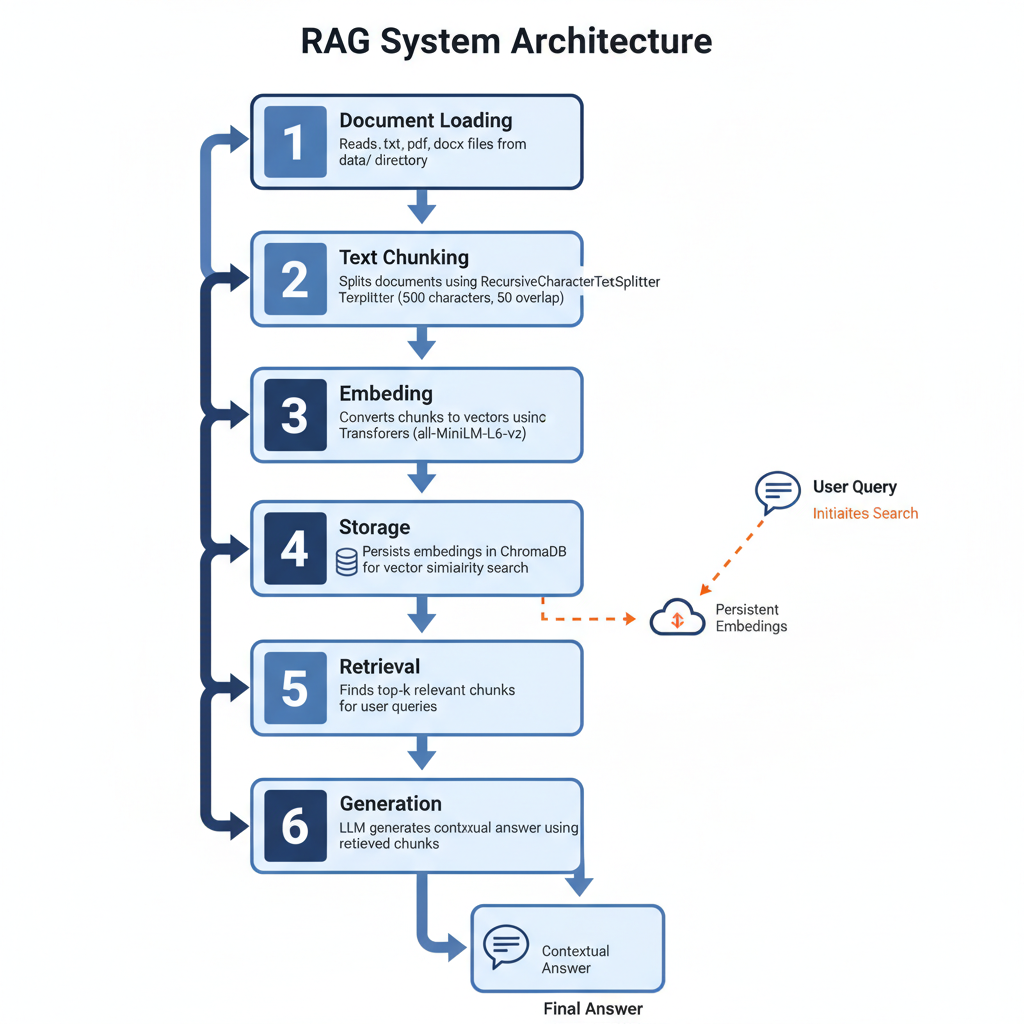Abstract
This project presents a Retrieval-Augmented Generation (RAG) system that enables intelligent question-answering over multi-format document collections. By combining semantic vector search with large language models (LLMs), the assistant provides accurate, context-aware responses from uploaded documents in .txt, .pdf, and .docx formats.
Motivation
Conventional chatbots struggle to answer questions about domain-specific or proprietary content. This project addresses that challenge by creating a searchable knowledge base directly from user-provided documents. Organizations and individuals can therefore build custom AI assistants that deliver accurate, source-backed responses tailored to their unique content.
System Architecture
The system implements a complete RAG pipeline:
- Document Loading – Reads .txt, .pdf, .docx files from data/ directory
- Text Chunking – Splits documents using RecursiveCharacterTextSplitter (500 characters, 50 overlap)
- Embedding – Converts chunks to vectors using Sentence Transformers (all-MiniLM-L6-v2)
- Storage – Persists embeddings in ChromaDB for vector similarity search
- Retrieval – Finds top-k relevant chunks for user queries
- Generation – LLM generates contextual answer using retrieved chunks

Technical Implementation
Core Technologies
- Framework: LangChain for orchestration
- Vector Database: ChromaDB (persistent)
- Embeddings: Sentence Transformers
- LLM Integration: OpenAI GPT, Groq Llama, Google Gemini
- Document Processing: PyPDF2, python-docx
Key Features
- Zero-shot understanding across multiple document formats
- Persistent vector storage for reproducibility
- Flexible support for multiple LLM providers
- Interactive CLI for experimentation
- Configurable similarity thresholds
Evaluation & Results
Test Corpus: 11 documents spanning AI, quantum computing, climate science, and biotechnology.
Sample Query
- Query: “What is artificial intelligence?”
- Response: Accurate definition retrieved from AI documents with context-aware synthesis
- Retrieval Time: Sub-second
- Relevance: High semantic similarity score
System Demonstrations
- Multi-document synthesis for comprehensive answers
- Domain-specific knowledge retrieval
- Clear handling of out-of-scope queries
- Optimized for single-turn interactions
Implementation Highlights
Development Practices
- Organized modular codebase (
app.py for pipeline, vectordb.py for DB logic)
- Secure API key management with
.env and .env.example
- Error handling for common issues (e.g., missing keys, unsupported files)
- Documentation with system diagrams for clarity
Practical Considerations
- Handles formats commonly used in organizations
- Straightforward setup and reproducibility
- User feedback during document processing
- Multi-provider LLM support to handle cost/availability constraints
Scalability Features
- Efficient indexing for large corpora
- Configurable chunking parameters
- Persistent vector database suitable for deployment
Limitations & Future Work
Current Optimizations
- Optimized for single-turn queries; multi-turn conversational memory planned.
- Performance is strongest with specific, context-rich queries; future work includes query expansion.
- Responses are limited to the uploaded corpus; planned enhancements include hybrid web + local retrieval.
- Document ingestion is manual; automation for continuous ingestion is under development.
Future Enhancements
- Conversation history and context management
- Automated document ingestion pipelines
- Advanced query reformulation techniques
- Enterprise system integration (e.g., SharePoint, Google Drive)
- Multi-modal retrieval (e.g., images, charts, tables)
Conclusion
This project demonstrates a complete RAG pipeline implementation aligned with Module 1 of the Agentic AI Developer Certification Program. By combining robust document processing, semantic search, and multi-provider LLM integration, the assistant lays a solid foundation for domain-specific AI solutions. It balances technical rigor with practical usability, paving the way for future extensions into conversational, automated, and multi-modal AI assistants.
